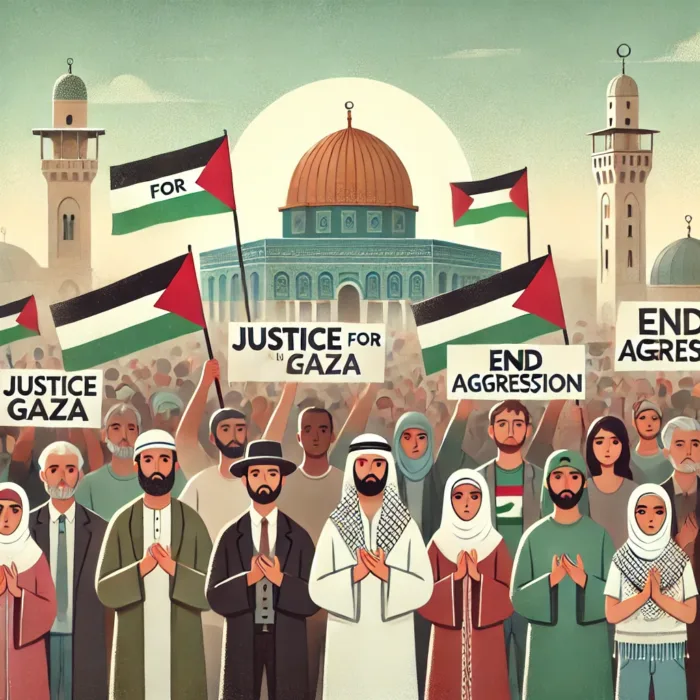Table of Contents
Challenging Misconceptions About the Palestine Issue
Some people note that there are non-Muslims who show solidarity with Palestinians and that, in America, certain Jewish communities protest against the aggression on Gaza. At the same time, there are Muslims who, regrettably, side with or cooperate with oppressive forces. This situation makes it clear that the issue of Palestine is not just an Islamic matter but one of land and humanity. Labeling it solely as an Islamic issue overlooks the non-Muslim supporters who might even be closer to us than some disloyal Muslims.

Moreover, those who support the Palestinian cause, regardless of their beliefs, are respected and appreciated, with hopes that they find a path to Paradise, even if they are polytheists, atheists, or have opposed Muslims in other circumstances.
Understanding the Islamic Foundation of the Palestine Issue
The logic mentioned earlier has flawed premises and consistently leads to incorrect conclusions. It is true that some non-Muslims show support for the people in Palestine through protests, and we are grateful for that. However, it is not accurate to consider those who back enemies fighting against Muslims as true Muslims simply due to an empty affiliation. Therefore, dismissing the importance of Islam in this context is mistaken.
ALLAH says:
“…And whoever is an ally to them among you – then indeed, he is [one] of them…”1
(Suraat ‘Al-Maa’idah, 5:51)
Such individuals are not considered part of us and are not counted among our ranks when making comparisons.
Secondly, the issue of Palestine is inherently Islamic because, as Muslims, our faith compels us to support it. Islam shapes every aspect of our lives, serving as the primary motivation and driving force behind our actions. Islam teaches that “The believers are but brothers…”2 and that “Indeed this, your religion, is one religion, and I am your LORD, so worship ME3“.
Therefore, a brother who is behind barriers and wires is still our brother, without any distinction. Borders hold no meaning for us when it comes to our unity. Even humanitarian motives, such as compassion for our brothers and the pursuit of dignity, are strengthened by our Islam, which preserves these sentiments, even if we are flawed and sinful, as long as we hold Islam as the absolute truth.
A Muslim does not need to justify their support for their brothers with a specific intention, such as “I do this out of Islamic duty, not just human compassion”. A Muslim is rewarded for sincere and natural actions, as long as they believe in the guidance of Islam in all matters, without being influenced by humanistic views that judge ideas and people outside the framework of Islam.
Balancing Islamic Principles with Universal Support
A person influenced by humanistic thoughts might sometimes feel compelled to downplay their Islamic identity and adopt a purely humanistic approach. Even when Islam guides them to act or feel in a certain way, they might choose to act based on human compassion alone, moving away from ALLAH’s commands. This can lead to a division in their personality and way of thinking.

If a non-Muslim faces injustice, do we refrain from helping them just because our motives are Islamic? Certainly not. Islam itself instructs us to support the oppressed, whether they are Muslim or not. However, for Muslims, this duty carries even greater significance. Therefore, the issue of Palestine—as an inseparable part of Muslim land and its people—is fundamentally an Islamic issue and does not need any other motives or standards for loyalty that compete with our religious principles.
Recognizing and Valuing Non-Muslim Support for Palestine
Thirdly, recognizing that the issue of Palestine is Islamic does not mean excluding non-Muslim supporters. On the contrary, we value their support and distinguish them from those who oppose us because of our faith, as instructed by our LORD.
ALLAH says,
“ALLAH does not forbid you from those who do not fight you because of religion and do not expel you from your homes – from being righteous toward them and acting justly toward them. Indeed, ALLAH loves those who act justly. ALLAH only forbids you from those who fight you because of religion and expel you from your homes and aid in your expulsion – [forbids] that you make allies of them. And whoever makes allies of them, then it is those who are the wrongdoers”
(Suraat ‘Al-Mumtahanah, 60:8-9)
Based on this, my approach to evaluating people is not limited to their stance on the Palestine issue alone, but follows a purely Islamic standard.
Those who strive to alleviate the suffering of our people in Palestine or elsewhere, even if they are not Muslim, are treated with kindness and justice as commanded by our LORD. The highest form of kindness is to invite them to Islam so they may be saved from the fire. There are non-Muslims, disbelievers, and polytheists who have made significant sacrifices recently. Some have been beaten while standing against injustice, some imprisoned, and some have lost their jobs. These individuals are the ones I strive not to limit to a partial cause or use solely for my own benefit, but to see them as brothers in Islam and to wish for their companionship in Paradise.
I do not need to approach these sympathetic non-Muslims with any measure other than Islam. Who has placed in their hearts the instinct to reject oppression and show mercy to the oppressed? It is ALLAH, Who revealed a complete Sharia that commands me to treat all people with truth and justice.
Exposing Hypocrisy and True Intentions
On the other hand, you see channels, YouTubers, and figures attacking Islamic rulings, spreading atheism among Muslims, promoting feminism, gender ideology, and the harmful ideas of the United Nations, while trying to polish their ugly image by supporting Palestine. Such actions reveal their true intentions; they seek to use Palestine as a facade to cover their wrongdoing. By undermining the beliefs of Muslims, they empower our enemies in Palestine and elsewhere, only to later lament over Palestine.
And to those who have fought Muslims in Syria, Iraq, and Yemen, widowing their women, orphaning their children, and violating their honor, only to later use Palestine to clean their image, we say: Muslims share equal blood and stand united against others. May ALLAH not reward you, nor bless you.
Conclusion
In conclusion, if we wish to attain honor in this world and salvation in the Hereafter, our motivations, positions, standards, and judgments must all be rooted in ALLAH’s revelation. We do not need loyalties or standards from outside our religion that cause us to pursue fleeting illusions in this life and strip our deeds of their reward in the Hereafter.
Source:
- Dr. Eyad Qunaibi. هل قضية فلسطين إسلامية أم إنسانية ؟. YouTube Video.

